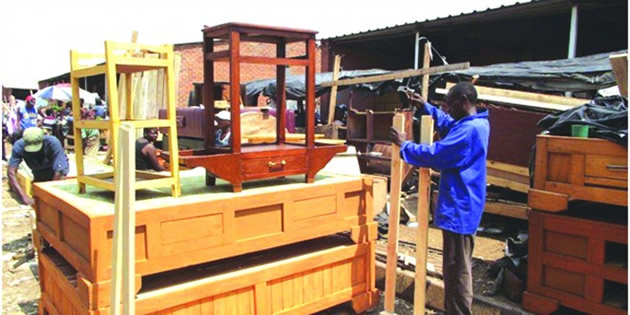SMEs getting a raw deal


 THE name SMEs at times, I think is derogatory. It brands business to remain that small. It’s like saying underdeveloped countries. It makes them remain underdeveloped.
THE name SMEs at times, I think is derogatory. It brands business to remain that small. It’s like saying underdeveloped countries. It makes them remain underdeveloped.
SMEs are valued at $6-10 billion countrywide, no doubt the maths is as big as this.
Do you know everyone is an SME including those gainfully employed, so no argument on the size of SMEs.
These have contributed significantly towards reducing the rate of unemployment and reducing poverty in our communities.
Needless to say, empowering SMEs is the new economic dispensation.
New economy, new players. This has made SMEs the major players in our economic equation.
Despite this scenario it seems SMEs are run on informal structures, which is detrimental to the entire economy.
Order is the first law in heaven, so why should earthly SMEs be any different.
There is no compliance for business and thus no contribution to the fiscus and thus bleeding the economy since these contribute 80 percent of the entire Zim business.
SMEs shun the banking facilities preferring hand to mattress kind of managing their hard earned cash.
Everyone wants to tap into this sector be it the government through Zimra, NSSA and local authorities.
In addition the government wants SMEs to reduce unemployment because that augurs well for the entire population.
Every authority wants a piece of SMEs as they are the economy right now.
It seems everything revolves around SMEs both informal and formal.
Unfortunately no one wants to nurture the so called SMEs. If you want to milk the cow you might as well damn feed the cow, it’s as is easy as that.
Banks haven’t been adequately funding this sector and in return the sector is also shunning the formal banking sector.
Where funding is available, it’s quite small so it affects growth of this sector.
Zimra has had headaches since the one size fits all to taxation does not apply to this sector.
It’s a new sector hence Zimra has to entice them to comply and regularise so that it’s a win-win situation.
Presently SMEs are sceptical about Zimra because of the cost of compliance regardless of their performance.
It’s about time we had a tax regime that accommodates informal business and addresses both revenue collection and health status of these small companies.
SMEs feel compliance means death during lean times and Zimra’s approach has aided this mistrust. Zimra needs SMEs, so courtship is encouraged to address non compliance than the “I’ll pounce on you like a ton of bricks” approach.
Local government is always playing Tom & Jerry (cat & mouse) with SMEs.
The question that arises is if you want money from the SMEs why not invest in infrastructure where they can work from then charge reasonable rates and everyone is happy.
Give them enough space at minimum compliance levels and they will generate revenue for the local authorities.
Here we’re talking proper structures and facilities since SMEs are the new economy.
Why support big businesses when your revenues are coming from SMEs yet you don’t treat them right.
Funding through Treasury has to measure up. The government is saying SMEs are the way to go but funding though the ministry is just peanuts.
Avail the ministry with huge funding to further reduce unemployment through SMEs lending that creates jobs.
NSSA, if you want money from SMEs then directly invest in SMEs, you have the capacity.
Please we mean real investments in terms of funding.
We’re talking of $100 millions of dollars then when these comply you will get your monies through fees.
There is a lot that local government can do to ensure compliance like making sure when big companies win tenders they also have SMEs working with them.
Build proper infrastructure and bill them accordingly. Zimra can also give some tenders to SMEs.
That way SMEs will register, comply and pay the necessary fees. In this regard it brings mentorship to the small players and it’s incentive enough to formalise operations.
It’s tit for tat, so the government, councils and NSSA and the banking sector must be innovative in approach to tap into the SMEs sector.
We recommend you to be creative as coersive behaviour will not work.
In addition do road shows in schools and advice (joint operation) on the advantages of compliance to the SMEs.
There is a need to do research on how best to tap into the sector and incentives that might be used to woo the sector to regularise.
It’s about time you think like business.
In order to make money you need to spend money.
In other words do invest in SMEs and you’ll achieve your objectives.
It’s as simple as that because the cost of being caught offside is not deterrent enough.
On the other hand we encourage SMEs to get formalised as there are numerous advantages of doing that besides merely getting adequate funding and contributing to the country’s employment.
The whole economy benefits and above all they themselves benefit more.
This sector needs to be galvanised in an unparalleled deliberate scientific big way.
Let’s put our money where our mouths are when it comes to SMEs because talk is cheap.
Let it show through deeds from authorities that this industry is the biggest employer in the country.
Let’s pour money into this industry but after we have trained and advised them accordingly.
Let’s end on a lighter note. What’s in a name? We are lobbying for a name change from SMEs to EE’s (emerging enterprises) so that there is belief that this industry will eventually grow to be big business.
The name SMEs weighs them down. It denotes stunted growth. Like one Reverend used to say you can’t name your son “Hluphekile” – it’s a recipe for disaster.









Comments